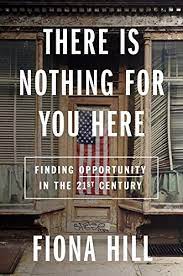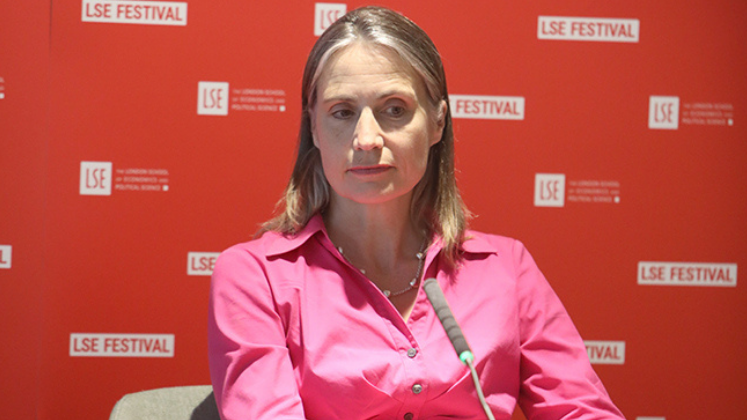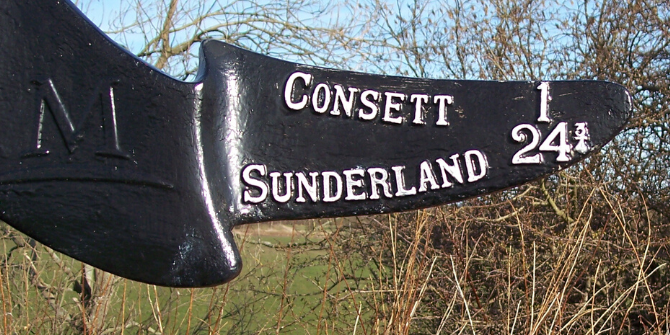In There is Nothing for You Here: Finding Opportunity in the Twenty-First Century, former National Security Council official Fiona Hill describes the journey that took her from County Durham to Washington, DC. Showing deep empathy towards those in ‘left-behind’ places and linking this predicament to shifts in geopolitics, this is a perceptive, lucid and frequently witty read, recommends John Tomaney.
If you are interested in this book review, you can listen to a podcast of Fiona Hill speaking as part of the LSE Festival 2022 event, ‘Russia, America, and the Future of European Security’, recorded on 15 June 2022.
There is Nothing for You Here: Finding Opportunity in the Twenty-First Century. Fiona Hill. Mariner. 2021.
Find this book (affiliate link):![]()
 In November 2019, I switched on BBC radio to listen to reports about the impeachment trial of President Donald Trump in the US Senate. To my surprise, the principal witness gave her testimony in the unmistakable cadences of County Durham. The witness was Fiona Hill, a former National Security Council official, who presented evidence against Trump, unleashing the ire of the US Republican Party and its media allies.
In November 2019, I switched on BBC radio to listen to reports about the impeachment trial of President Donald Trump in the US Senate. To my surprise, the principal witness gave her testimony in the unmistakable cadences of County Durham. The witness was Fiona Hill, a former National Security Council official, who presented evidence against Trump, unleashing the ire of the US Republican Party and its media allies.
In There is Nothing for You Here, Fiona Hill describes the journey that took her from County Durham to the imperium of Washington, DC. At its heart, the book concerns the fate of what have become known as ‘left-behind places’ – communities which have become economically, socially, culturally and politically uncoupled from broader prosperity and which have responded, in her view, to the siren call of populism. Her hypothesis is that ‘There are political costs when places are effectively written off and their most basic needs are neglected’ (181). The title of the book, ‘There is Nothing for You Here’, derives from her father’s injunction, which propelled the teenage Hill out of her hometown in the 1980s.
There is now a growing body of academic research about ‘left-behind places’ and a nascent literary genre. The latter often rests on the trope of a person who has departed their small town for the bright lights of the big city and makes a ‘very personal return journey’ to investigate the plight of those left behind. In the US, it is perhaps exemplified by JD Vance’s Hillbilly Elegy, an excoriation of a white working-class culture in Appalachia, to which Trumpism spoke. In the UK, in a similar vein, a small explosion of books, of variable quality, addresses the fate of forgotten towns. Gabrielle Chan’s insightful account of the decline of small-town Australia offers another perspective. Beyond the Anglophone world, Édouard Louis’s autobiographical novel, The End of Eddy, recounts his brutal upbringing in impoverished Hallencourt in Picardy, France; elsewhere, he reports why his working-class father votes for Marine Le Pen.
What distinguishes Hill’s contribution is the deep empathy she displays toward people in ‘left-behind places’ that allows her to show what people feel they have lost; and her ability to link their predicament to shifts in geopolitics, rather than to seek explanations rooted solely in the character of the places themselves or in simple claims about the outcome of market forces. About this, Hill writes perceptively and lucidly, and the text is enlivened by always effective, and often funny, anecdotes.

Image Credit: Crop of ‘Fiona_Hill_0605’ by LSE in Pictures. All rights reserved.
The first part of the book describes growing up in County Durham. Hill convincingly evokes the remarkable world of Durham coal-mining villages, of which she caught the tail-end in the 1970s and 1980s. (Full disclosure: I too was born and brought up in County Durham around the same time as Hill and, indeed, was acquainted with some of the characters and shared some of the experiences mentioned in the text.) Of course, these were poor places for much of their history but, as Hill astutely observes, they were marked by civic pride, a strong sense of belonging and intense traditions of collective self-help. Following nationalisation of the mines and the expansion of the welfare state after 1945, these communities experienced full employment and rising living standards: ‘In the 1950s, the Durham miners thought they had made it’ (25).
But, as Hill reached adulthood, this world was disappearing fast. Her father began his working life as a miner but when his colliery closed, he had to find employment as a porter at a local hospital where he met Hill’s mother, a midwife. (Alf Hill, though, continued to identify himself as a Durham miner. He lost not just a job but an identity.) Marked out early on as a ‘clever lass’ (54), Fiona was able in the 1980s to take advantage of what was left of the ‘infrastructure of opportunity’ (46) bequeathed by the welfare state and the collective institutions of the region. Her local Labour MP gave her early encouragement and, at a key moment, her Dad’s old trade union, the once mighty Durham Miners’ Association, gave her a grant to take a language course in pursuit of her ambitions to go to university. She writes: ‘I was a product of the “Labour Party at work”’ (102).
Coming of age at the end of the Cold War, Hill was determined to study Russian. Her journey into higher education was marked by microaggressions directed at her class origins and regional accent. (Accent, she notes, is a key battlefield of the class war in the UK.) There is an excruciating account of her failed entrance interview to Oxford University that ends in humiliation. Gaining entry to the University of St Andrews, she spent a year studying in Moscow. Here things took off. By a series of what Hill describes as accidents – but more likely resulting from her force of personality – she ended up studying at Harvard, eventually gaining a PhD.
The second part of the book tells of Hill’s career as an academic, think tanker and government official in the US, deploying her expertise on Russia, which also involved extended periods working there. The US was a liberation because the class discrimination she experienced in the UK did not seem to travel across the Atlantic. In the US, though, gender discrimination appeared more apparent in the professional worlds she inhabited. Hill states that, despite the everyday sexism she encountered in her youth, her gender was not a barrier to her educational ambitions in the UK. It was class that mattered.
Hill’s visits to Russia coincided with the disintegration of the Soviet Union, the resulting ‘market shock’ therapy and the collapse of communities based on traditional industries. While Moscow eventually boomed, small Russian towns were marked by rampant alcoholism, declining life expectancy, drastic depopulation and the abandonment of the elderly. Such places became engulfed in ‘cultural despair’, fuelled by ‘a sense of loss, grievance and anxiety’ (156). These conditions, Hill notes, provided fertile ground for the populism of Vladimir Putin who promised to restore Russian pride. She draws parallels with County Durham and, later, with the rise of Trump in the US.
The third part of the book details Hill’s experience once she was appointed to the US National Security Council. She attributes Trump’s election to his appeal to people who had lost their identities and cultural moorings as well as their jobs. Hill acknowledges that Russia interfered in the presidential election but stresses that domestic factors were more important in determining its outcome.
Her job gave her a ringside seat at the West Wing. She describes the undisguised and pervasive misogyny of Trump’s White House, where her role and expertise were consistently belittled. She confirms the President’s unbridled narcissism and gigantic but brittle ego and how this translated into policy and diplomatic choices that destabilised world politics. Trump, she writes, suffered from ‘autocrat envy’ (226), coveting the strongman status of Hungary’s Viktor Orbán, Turkey’s Recep Tayyip Erdoğan and China’s Xi Jinping, and was especially envious of Putin and his vast ill-gotten wealth. But although presenting himself as an ordinary American against the ‘elites’, while holding the public in contempt, Trump was less adept than Putin at fomenting and exploiting social and political divisions to maintain power. In office, Trump was lazy, never read his briefs and could not stick to his own policy plans. His administration was characterised by incessant pettiness, chaos, vindictiveness and infighting, all of apiece with Trump’s worldview, leaving national security exposed and his manifesto unfulfilled.
A subplot of the story concerns the failure of the traditional parties of the working class. On visits to her relatives in County Durham, Hill is told ‘the Labour Party had abandoned the working class’ (179). This phenomenon was echoed in the US. She attributes this to the ‘lack of a direct relationship between ordinary people and prominent intellectual elites’ (154). For Hill, Hilary Clinton personifies this problem. During the 2016 presidential election, Clinton notoriously – and probably disastrously – referred to many Trump supporters as a ‘basket of deplorables’. In 2022, Clinton had ‘lunch with the FT’ at the Michelin-starred Blue Duck Tavern at the 5* Park Hyatt in Washington DC’s swanky West End district. Over her $44 Chesapeake Bay Jumbo lump crab cake, Clinton puzzled over why people are so nostalgic about mining communities: ‘Whether they were from West Virginia or Tyneside, their lives were so grim and disease-prone and unhygienic — but the nostalgia for those days. I don’t know.’ There is Nothing for You Here furnishes us with insights that might ease Clinton’s puzzlement. Hilary should have met Alf Hill.
In the final part of the book, Hill outlines an alternative policy prescription. This focuses especially on the power of education and makes many good arguments but also contains a contradiction. The importance of place as the main locus of politics is the key theme of the book, but the policy prescriptions are generic. We lose sight of place. For instance, for the US, Hill proposes a new federal agency for rural development. But this feels like a Beltway solution – what evidence is there that the Feds know what to do about rural America? Meanwhile, her own brilliantly told story shows that County Durham thrived when it had the power collectively to help itself.
Note: This review gives the views of the author, and not the position of the LSE Review of Books blog, or of the London School of Economics and Political Science. The LSE RB blog may receive a small commission if you choose to make a purchase through the above Amazon affiliate link. This is entirely independent of the coverage of the book on LSE Review of Books.








Very much looking forward to the ‘in discussion with’ ! Have told all my marras about it!
Tyne Tees did a story on Ashington (a few miles north) where I and my family are from, a few years back. In talking to the local school kids, none had a hope for the future in the town. Around that time, when we visited the house my great-grandparents had lived in, the 80-year old lady living there was going to join her family in Australia, where they had gone to find work. I luckily left earlier than Dr. Hill, and was able to find success in the States as a Mining Engineer, but there were not that many of us. I found her perception on what communities must do that have been built around mining, but seen it die, to be enlightening, and given that there are many similar regions in this country, would wish that more folk read that part of the book.
So good that she is now Adviser on Defence in the new Labour givernment.